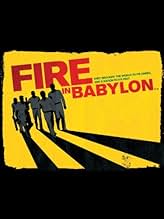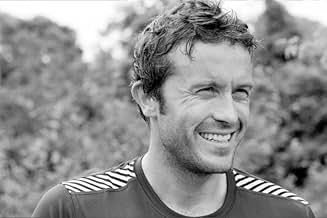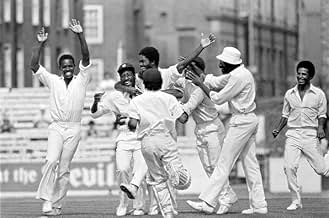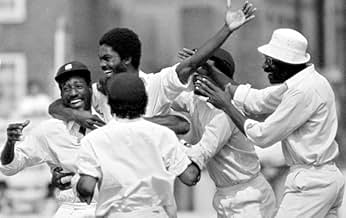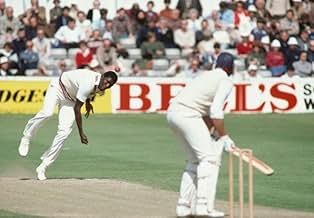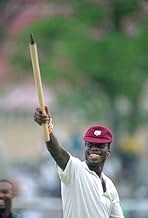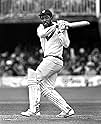A documentary on the West Indies cricket team's rise to being the best in the world, and one of the greatest cricket teams the world has ever seen, in the late-1970s and how they maintained ... Read allA documentary on the West Indies cricket team's rise to being the best in the world, and one of the greatest cricket teams the world has ever seen, in the late-1970s and how they maintained that invincibility in the 1980s.A documentary on the West Indies cricket team's rise to being the best in the world, and one of the greatest cricket teams the world has ever seen, in the late-1970s and how they maintained that invincibility in the 1980s.
- Awards
- 3 nominations total
Bishan Singh Bedi
- Self
- (archive footage)
Richie Benaud
- Self - Commentator
- (archive footage)
- (voice)
Dickie Bird
- Self
- (archive footage)
Ian Botham
- Self
- (archive footage)
Geoffrey Boycott
- Self - Commentator
- (archive footage)
- (voice)
Brian Close
- Self
- (archive footage)
John Craven
- Self
- (archive footage)
Duncan Fearnley
- Self
- (archive footage)
David Frost
- Self
- (archive footage)
- Director
- Writer
- All cast & crew
- Production, box office & more at IMDbPro
Featured reviews
It is a good watch for a cricket fan especially. But being a documentary, using wrong facts is enough to put off a lot of people who are able to catch the inaccuracy. And this documentary does it on more than one occasion.
In one of the matches in the 1976 series between WI and India, several Indian batsman were injured and had to retire hurt! Stevan Riley uses this fact and presents that Indians were demolished in the series by a fearsome WI team (when in fact the series was 2-1 in favor of WI and India had won one of the matches on back of a record 4th inning chase of 404 that was broken only in 2003 says a lot).
A more glaring inaccuracy: Stevan uses the video footage of a 1981 incident to depict that Indians could not face WI in 1975-76 series and walked off the field declaring their innings. The video footage is of an incident in Australia when Sunil Gavaskar threw tantrums on being given out lbw (possibly incorrectly) against Lillee and was walking off with his partner in disgust!
For a documentary to depict inaccurate facts is big turn off! It would have been OK if it was some 'masala' movie but definitely not for a documentary which claims to document some true incidents.
In one of the matches in the 1976 series between WI and India, several Indian batsman were injured and had to retire hurt! Stevan Riley uses this fact and presents that Indians were demolished in the series by a fearsome WI team (when in fact the series was 2-1 in favor of WI and India had won one of the matches on back of a record 4th inning chase of 404 that was broken only in 2003 says a lot).
A more glaring inaccuracy: Stevan uses the video footage of a 1981 incident to depict that Indians could not face WI in 1975-76 series and walked off the field declaring their innings. The video footage is of an incident in Australia when Sunil Gavaskar threw tantrums on being given out lbw (possibly incorrectly) against Lillee and was walking off with his partner in disgust!
For a documentary to depict inaccurate facts is big turn off! It would have been OK if it was some 'masala' movie but definitely not for a documentary which claims to document some true incidents.
An excellent snapshot of an era in which the West Indies turned cricket's traditional order on its head and gave it all a soundtrack too through reggae music. It is told almost entirely through the viewpoint of the team members with the occasional burst of pride from musicians and poets, mainly through song and notably Bunny Wailer provides some excellent insight into the pride the islands took in their united team.
There was plenty said about the team by the (foreign to them) press and commentators as they raced to the top of test cricket but not so much credit so I think the film's solely West Indies angle is justified. The film also explores the legacy of prejudice that the West Indies team did much to expose. Corporal Jones always maintained that "they don't like it up them" and Holding, Garner, Roberts and Croft proved that it was true of us too. Croft's decision to tour Apartheid South Africa is given to the viewer to judge. Respect was earned and cricket changed with it. It may be a one sided view but you leave with no doubt that the helmet-less and pad-scant men that stood up to such bowling were brave souls too.
Great music, audience maturity respected, wince-inducing footage, some laughs and Sir Vivian Richards. An hour and a half well spent for me.
There was plenty said about the team by the (foreign to them) press and commentators as they raced to the top of test cricket but not so much credit so I think the film's solely West Indies angle is justified. The film also explores the legacy of prejudice that the West Indies team did much to expose. Corporal Jones always maintained that "they don't like it up them" and Holding, Garner, Roberts and Croft proved that it was true of us too. Croft's decision to tour Apartheid South Africa is given to the viewer to judge. Respect was earned and cricket changed with it. It may be a one sided view but you leave with no doubt that the helmet-less and pad-scant men that stood up to such bowling were brave souls too.
Great music, audience maturity respected, wince-inducing footage, some laughs and Sir Vivian Richards. An hour and a half well spent for me.
This would be it. A very, very good example of the documentary film art, I think. I was a child in the 70s, and loved watching the matches and players referred to in this film, but had no idea what was going on off the pitch.
Of course the film makers have a point of view they are promoting, but since it's one that was NEVER heard elsewhere, it is certainly fair that they take the chance to provide a different context and some background to the very widely promoted views of the Windies pace attack of the time. The clear connection between the socio-political environment and the players' motivation was fascinating, and the graphic illustration of the shameless and shameful racism and colonial bigotry was illuminating. I can't recommend this film highly enough to any fan of sports documentaries.
Of course the film makers have a point of view they are promoting, but since it's one that was NEVER heard elsewhere, it is certainly fair that they take the chance to provide a different context and some background to the very widely promoted views of the Windies pace attack of the time. The clear connection between the socio-political environment and the players' motivation was fascinating, and the graphic illustration of the shameless and shameful racism and colonial bigotry was illuminating. I can't recommend this film highly enough to any fan of sports documentaries.
It was a privilege to attend the World Premiere of this new documentary at the 2010 London Film Festival. Director Stevan Riley has made an exhilarating piece that describes the events which led to the West Indies cricket team rising from also-rans in the early 1970s to a fearsome, all-conquering force by end of the decade, and at the same time becoming cultural icons who inspired a generation of black people still struggling to emerge from a history of slavery and oppression.
The story is told entirely from the West Indians' point of view, and in their own words - this is not so much a discussion as a celebration of an inarguably glorious period of sporting history. The list of contributors is a cricketing hall-of-fame roll call: Richards, Lloyd, Holding, Roberts, Greenidge, Haynes, Garner and more are joined by other significant names from Caribbean culture. All are hugely entertaining orators who could easily have kept this relatively short production going for another 3 hours.
This is a film that should appeal to cricket fans, sports fans, and those not remotely interested in sport. A film full of entirely new interviews and perspectives will please the already-initiated, but the wider significance of this cricketing success make it accessible, and vital, viewing for everyone.
The story is told entirely from the West Indians' point of view, and in their own words - this is not so much a discussion as a celebration of an inarguably glorious period of sporting history. The list of contributors is a cricketing hall-of-fame roll call: Richards, Lloyd, Holding, Roberts, Greenidge, Haynes, Garner and more are joined by other significant names from Caribbean culture. All are hugely entertaining orators who could easily have kept this relatively short production going for another 3 hours.
This is a film that should appeal to cricket fans, sports fans, and those not remotely interested in sport. A film full of entirely new interviews and perspectives will please the already-initiated, but the wider significance of this cricketing success make it accessible, and vital, viewing for everyone.
Cricket, a game so vast and important, have really lost it's way in past few decades. This documentary definitely shows the impact of cricket in colonies, and the psychology behind the sport in it's early modern days.
West Indies were champions, and this sporting lead is way bigger than many we have seen in other sports over the years. Cricket is underrated and these stories are getting the brunt of it, as they really struggle to get a reach.
As time progresses, it would be even more important to remember the colonial past as it will keep being distinct, and that will stop so many people from reaching their peak.
In the end, it's about sports, but the bigger theme is definitely human emotions, and fast bowling. Fast bowling is the most dangerous thing on a cricket field, and the sport is getting more and more difficult for them as the new ruled keep trimming the value of bowlers.
So, I believe that every cricketer, and decision maker should see this and learn the game from these legends.
West Indies were champions, and this sporting lead is way bigger than many we have seen in other sports over the years. Cricket is underrated and these stories are getting the brunt of it, as they really struggle to get a reach.
As time progresses, it would be even more important to remember the colonial past as it will keep being distinct, and that will stop so many people from reaching their peak.
In the end, it's about sports, but the bigger theme is definitely human emotions, and fast bowling. Fast bowling is the most dangerous thing on a cricket field, and the sport is getting more and more difficult for them as the new ruled keep trimming the value of bowlers.
So, I believe that every cricketer, and decision maker should see this and learn the game from these legends.
Did you know
- TriviaThe bowler featured at the very beginning is Jason Holder, all-rounder and appointed captain of the West Indian ODI side in late 2014.
- Quotes
Tony Greig: I Intend to make them grovel
- How long is Fire in Babylon?Powered by Alexa
Details
- Release date
- Country of origin
- Official site
- Language
- Also known as
- Storyville: Fire in Babylon
- Filming locations
- Production companies
- See more company credits at IMDbPro
Box office
- Gross worldwide
- $385,451
- Runtime
- 1h 27m(87 min)
- Color
- Aspect ratio
- 1.78 : 1
Contribute to this page
Suggest an edit or add missing content


